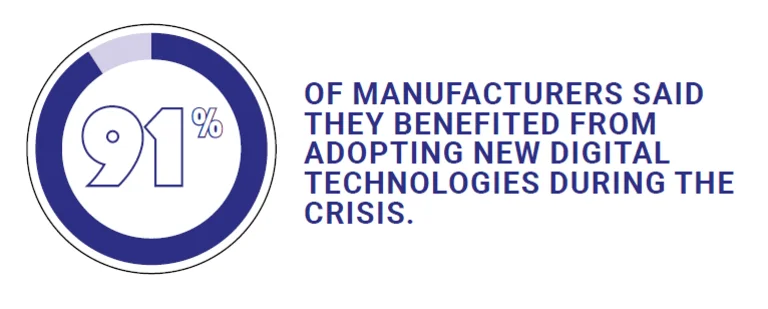British manufacturing companies took quick and significant steps towards digitalisation when the pandemic struck, with nearly half moving to digital working practices within two weeks of lockdown, according to new research. With just a fortnight’s digital installation and planning, 94% of companies said they had staff working successfully from home in industries often associated with manual tasks and an extremely high proportion of production-based work.

|

|
A quarter of companies polled said utilising new digital technologies had boosted productivity and 12% said it had increased their production levels.
In the past few months, it is those skills which enabled the quick adoption of digital to deliver virtual trade exhibitions, the use of 3D avatars for sustainable sampling and virtual commissioning, alongside the delivery of remote production and monitoring systems to keep vital lines working effectively. The use of digital was also found to accelerate innovation plans.

This acceleration must continue at pace if UK manufacturing is to power ahead as the sector rebuilds.
To futureproof both our recovery and future, Government and industry need to address not just the immediate term needs, but also the mid-term and longer-term. This includes the establishment of a National Skills Taskforce, with a remit that includes the development of a flagship digital skills programme as well as a digital skills account for lifelong learner – so that employees that need to skill and reskill through their careers and employers can do so with ease.
The last six months have shown that digital has been crucial in making it possible for manufacturers to continue production successfully - highlighting the need to ramp up digital skills within the manufacturing sector even further as companies move to build future resilience and boost productivity.

This Make UK research is promising, yet also acts as a stark reminder of the challenges businesses, particularly manufacturers, face in the coming months. It is clear the 91% of manufacturers that have benefited from the adoption of new technology understand the importance of digital; the ones that have invested and adopted in digital are the ones that have adapted quickest.
As two-thirds of manufacturers don’t think the education and training system is fit for purpose to help them adopt of new digital technologies, we now need to look at what support there is for them to bridge any digital skills gaps.

